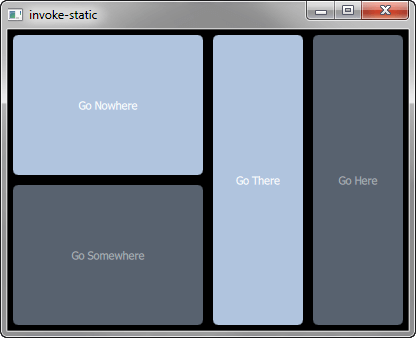Qt SCXML Invoke Example (Static)
Invokes a compiled nested state machine.

Invoke Example (Static) demonstrates how to use the <invoke> element with generated nested state-machines, where the SCXML file is compiled to a C++ class. The <invoke> element is used to create an instance of an external service.
Running the Example
To run the example from Qt Creator, open the Welcome mode and select the example from Examples. For more information, visit Building and Running an Example.
Invoking the State Machine
In statemachine.scxml, we specify a state machine with the name Directions of type http://www.w3.org/TR/scxml/ to invoke:
<scxml
xmlns="http://www.w3.org/2005/07/scxml"
version="1.0"
name="Directions"
initial="anyplace"
>
<state id="anyplace">
<transition event="goNowhere" target="nowhere"/>
<transition event="goSomewhere" target="somewhere"/>
<state id="nowhere"/>
<state id="somewhere">
<invoke type="http://www.w3.org/TR/scxml/">
<content>
<scxml name="anywhere" version="1.0">
<state id="here">
<transition event="goThere" target="there"/>
</state>
<state id="there">
<transition event="goHere" target="here"/>
</state>
</scxml>
</content>
</invoke>
</state>
</state>
</scxml>
Compiling the State Machine
We link against the Qt SCXML module by adding the following line to the invoke-static.pro file:
QT += qml scxml
We then specify the state machine to compile:
STATECHARTS = ../invoke-common/statemachine.scxml
The Qt SCXML Compiler, qscxmlc, is run automatically to generate statemachine.h and statemachine.cpp, and to add them to the HEADERS and SOURCES variables for compilation.
Instantiating the State Machine
We instantiate the generated Directions class in the invoke-static.cpp file, as follows:
#include "statemachine.h" int main(int argc, char *argv[]) { QGuiApplication app(argc, argv); qmlRegisterType<Directions>("Directions", 1, 0, "Directions"); QQmlApplicationEngine engine; engine.load(QUrl(QStringLiteral("qrc:/invoke-static.qml"))); if (engine.rootObjects().isEmpty()) return -1; return app.exec(); }